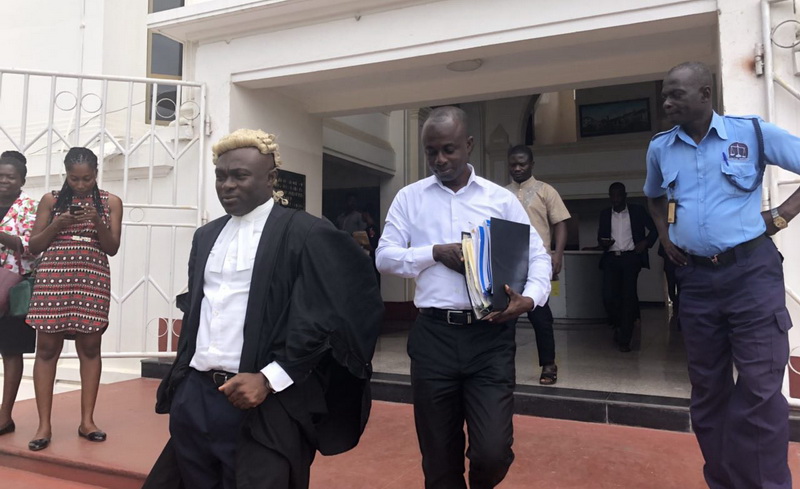
Supreme Court awards GhȻ45,000 to teacher wrongfully jailed 15 years
The Supreme Court has ordered the government to pay GH¢45,000 as compensation to Mr Eric Asante, a teacher who was wrongfully jailed for 15 years on allegation of defiling and impregnating a 14-year-old student.
In a unanimous decision, the five-member panel of the court also ordered the government to pay all the salaries and allowances Mr Asante lost during his 13 years behind bars.
“It is hereby ordered that GH¢45,000 be paid by the government of Ghana as compensation under Article 14 (7) of the 1992 Constitution,’’ the court ordered.
Article 14(7) gives the Supreme Court the power to decide what sort of compensation must be paid to a person who has served the whole or part of a sentence but has been acquitted by a court of competent jurisdiction.
The five-member panel was presided over by Mr Justice Anin Yeboah, with Mr Justice Paul Baffoe-Bonnie, Mr Justice Sule Gbadegbe, Mr Justice Gabriel Pwamang and Mr Justice Yaw Appau as the other members.
Claim for compensation
Mr Asante spent 13 years behind bars for a crime he never committed.
But, on January 26, 2017, he was acquitted and discharged by the Supreme Court after it held that his conviction and sentence had no basis in law.
The court came to that determination following a DNA test which proved that Mr Asante was not the father of the child born out of the said defilement.
After his acquittal, Asante, through his lawyers, filed a claim for compensation in excess of GH¢7.3 million.
He wanted compensation for the lost salaries as a teacher, what he could have earned as a part-time teacher and the money he would have earned from other investment activities.
The teacher also wanted compensation on the basis that he suffered psychological and emotional anguish, as well as mental disorder, throughout his 13-year incarceration.
Reasons for the GH¢45,000
In its ruling, however, the apex court held that Mr Asante failed to prove that he suffered any mental disorder while in prison and was also unable to justify his claim for the other damages.
“Throughout his appearance, he presented himself as a healthy young man,’’ the court stated.
The court was also of the view that it took into consideration the fact that Mr Asante had been reinstated as a teacher.
“We must also protect the public purse and come out with a rational and reasonable sum to compensate for this injustice,’’ it said.
The apex court, therefore, awarded Mr Asante GH¢3,180 for each year he spent behind bars.
Since Mr Asante was incarcerated for 13 years from the day of his arrest to the time spent in prison, he was entitled to GHc41,340, but the court rounded it up to GH¢45,000.
Paltry sum
Counsel for Mr Asante, Mr Victor Kwesi Opeku, however, expressed his disappointment at the amount awarded his client.
In an interview after the ruling, he said the decision of the Supreme Court meant that the state had been let off the hook for an injustice meted out to his client.
“I am very disappointed that the court threw out all the claims we made and awarded a paltry sum of GH¢45,000.
“For the state to completely destroy a young person’s life for 13 years and get away with GH¢45,000 is not deterrent enough,’’ counsel said.
Background
Mr Asante was arrested on December 14, 2003 and charged with the defilement of a 14-year-old student.
On September 5, 2005, he was jailed 15 years in hard labour by the Tamale High Court for the offence of defilement.
The student claimed that Mr Asante was her lover and that he had, on many occasions, had sexual relations with her.
Throughout the trial and even in prison, Mr Asante consistently denied the charges levelled against him, insisting that he never had any amorous relationship with the girl.
He, therefore, initiated an appeal at the Court of Appeal to prove his innocence, but, in October 2006, the Court of Appeal dismissed his appeal and upheld his conviction.
Not satisfied, Mr Asante appealed to the Supreme Court in 2012. The apex court ordered a DNA test to be conducted to ascertain whether or not the teacher was the father of the child.
In a unanimous decision on January 26, 2017, the five-member panel held that the DNA test proved that Mr Asante was not the biological father of the baby and, therefore, he could not have been responsible for the pregnancy that brought forth the child.
According to the court, apart from the pregnancy, the prosecution in the trial that led to the conviction failed to present any other evidence that the alleged victim had been defiled by Mr Asante.
It further held that the so-called victim of the defilement, by lying that the teacher had impregnated her, was dishonest and, therefore, her testimony was deliberately false.
